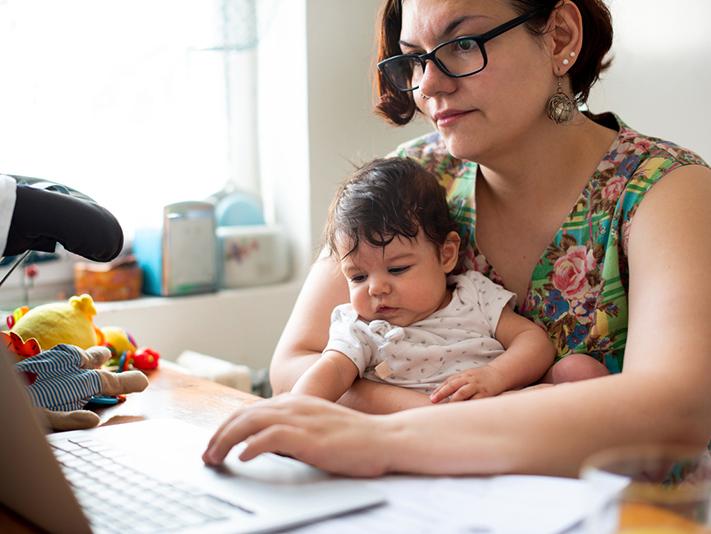Car-parking provision may seem like a trivial concern, but little acts of care and understanding make a huge difference to people’s working days. Advocating for all university staff with parental or caring responsibilities to be granted permits for on-campus parking is one example of the small but profound difference that staff networks can make. Efforts of our Parents and Carers Network eased pressure for staff who need to use their car to drop off and pick up children or to facilitate other arrangements for their dependants.
The PCN at the University of Southampton has four key purposes: to provide university leaders with insight into the needs of employees with parental or caring responsibilities; to organise activities and events of value to network members; to raise awareness of policies relevant to staff with parental or caring responsibilities; and to provide a safe and supportive networking environment.
Advocating for members
The network ensures that university leadership and other teams across the organisation hear its members’ collective voice. Taking the time to build relationships with policymakers in human resources, using channels of escalation and simply talking about the network with colleagues are all great ways to increase the likelihood that leaders will turn to you for insights. For example, we served as key stakeholders when HR refreshed our organisation’s family life policies. We were invited to provide feedback on wording for the policy and on the user journey of the SharePoint site where the new policies were to be stored. It felt like a truly collegiate moment when the new policy pages were launched.
- Spotlight guide: How to factor family into higher education
- What can universities do to support academic couples?
- What parents need to succeed in academia and how universities can help
Of course, it is also beneficial for teams developing new policies and processes to be able to say they have engaged with stakeholders, so it’s a win-win situation.
Activities and events
Network meetings offer opportunities for internal guest speakers to share information on a topic relevant to parents and carers, such as career pathways (which are often tricky to navigate when returning from parental leave), pensions (financial planning is especially important when considering the future of your dependants), types of leave available (why are children ill so often?!), and well-being and workplace stress (an important focus for us all, but especially so for those whose home lives may mean we start and end each day frazzled).
These meetings create a forum for colleagues to raise topics that are important to them, and to seek opinions and experiences from others in similar situations.
We also invite external speakers on occasion. These have included talks from experts on parenting (such as a session entitled “Foundations for positive behaviour”) and a GP with a special interest in adolescent mental health addressing smartphone and social media use in young people.
Activities can be less formal, such as in-person cuppa sessions. There’s so much value in connecting with others in similar phases of life. Some of the best work relationships I’ve built in recent years have been down to a chance chat in which we’ve found our kids are learning the violin at the same time…
The value of signposting policies and resources
A network can also support parents and carers in balancing their work and home-life responsibilities through signposting to relevant internal policies and external resources. We often share details of sessions run by the local Child and Adolescent Mental Health Service, for example, and by charities – either local or national – that support unpaid carers. In a large, fast-moving organisation, it’s easy to miss announcements and resources, and the network acts as a friend that can give members a gentle nudge and reminder of things that may affect them.
A few months ago, I shared details of an online paediatric first-aid course with the network and signed up myself. When I joined the first session, I realised a network member was also on the call who had heard about the course through the network.
Creating a safe space for open conversation
Perhaps our most important role is providing a safe and supportive environment in which people can be open about their stresses and strains, seek peer networking and ultimately feel less alone. Sometimes we may feel pressure to keep home life separate from work – mothers in particular (but fathers, too) may be familiar with the societal pressure to “work like you don’t have children, and parent like you don’t have a job”, but having a place we can be honest about how tired we are, how upset, how worried, how stressed...means that we can set this aside and focus on our paid work, rather than bottling it all up.
We hold regular sessions for parents of neurodivergent children, and these colleagues frequently say that it is so valuable to simply talk to others who truly understand how it feels to come to work having already spent three hours or more negotiating, supporting, regulating and emotionally balancing their family members. Often they feel they have done a day’s work before the workday has even begun!
Almost half of respondents to a recent survey of parents of children with special educational needs said they had to reduce their working hours or change their role when fighting to get the correct education and healthcare plan for their child – with 41 per cent of respondents having to give up work completely. If we can support these colleagues better, we can hope to reduce these numbers.
In an ageing society, more of us will find ourselves “sandwich caring”. This term encompasses simultaneous caring responsibilities for both young children and older relatives; an estimated 2 per cent of the UK population are sandwich carers.
Ongoing value of parents and carers networks
My colleague Laura Howells and I took over as co-chairs of the network in 2023, after it had laid somewhat dormant for several years. We had both benefited from it and felt it was time to give something back to the community, although when Laura suggested we took it on, I confess I did groan at first. More responsibility? However, it’s ended up being a real passion. I hope every day that I’m helping our members just a little in the eternal juggle of life.
Parents and carers have a huge amount to contribute to their workplaces, and in a society that puts increasing amounts of pressure on those with dependants, everything organisations can do to support these colleagues is worthwhile. Parenting and caring are hard tasks, and parents and carers networks can lighten the load a little – and sometimes a small shift makes a big difference.
Claire Partridge is internal communications manager and co-chair of the Parents and Carers Network at the University of Southampton.
If you would like advice and insight from academics and university staff delivered direct to your inbox each week, sign up for the Campus newsletter.




comment